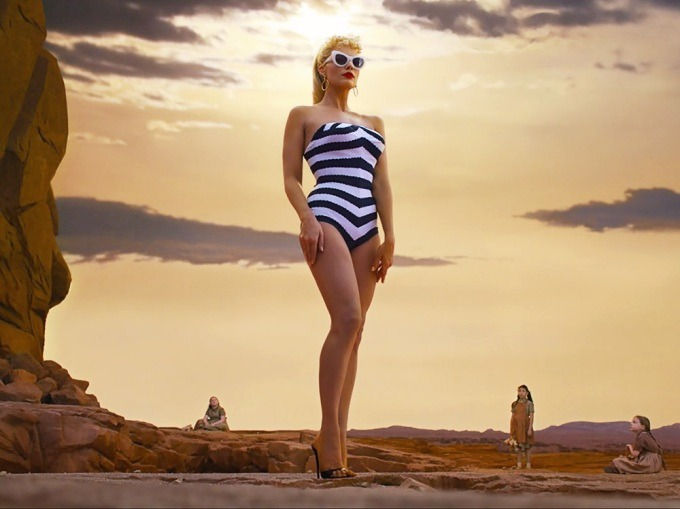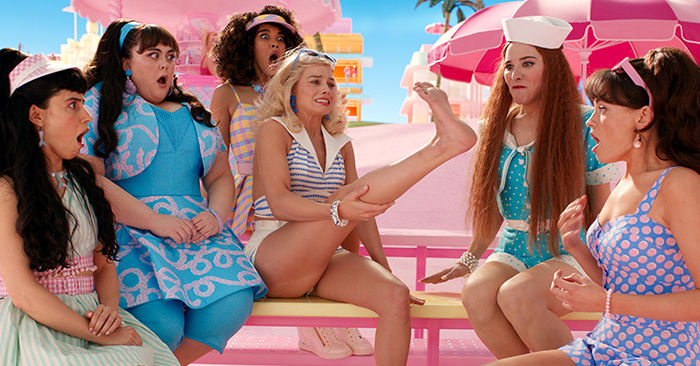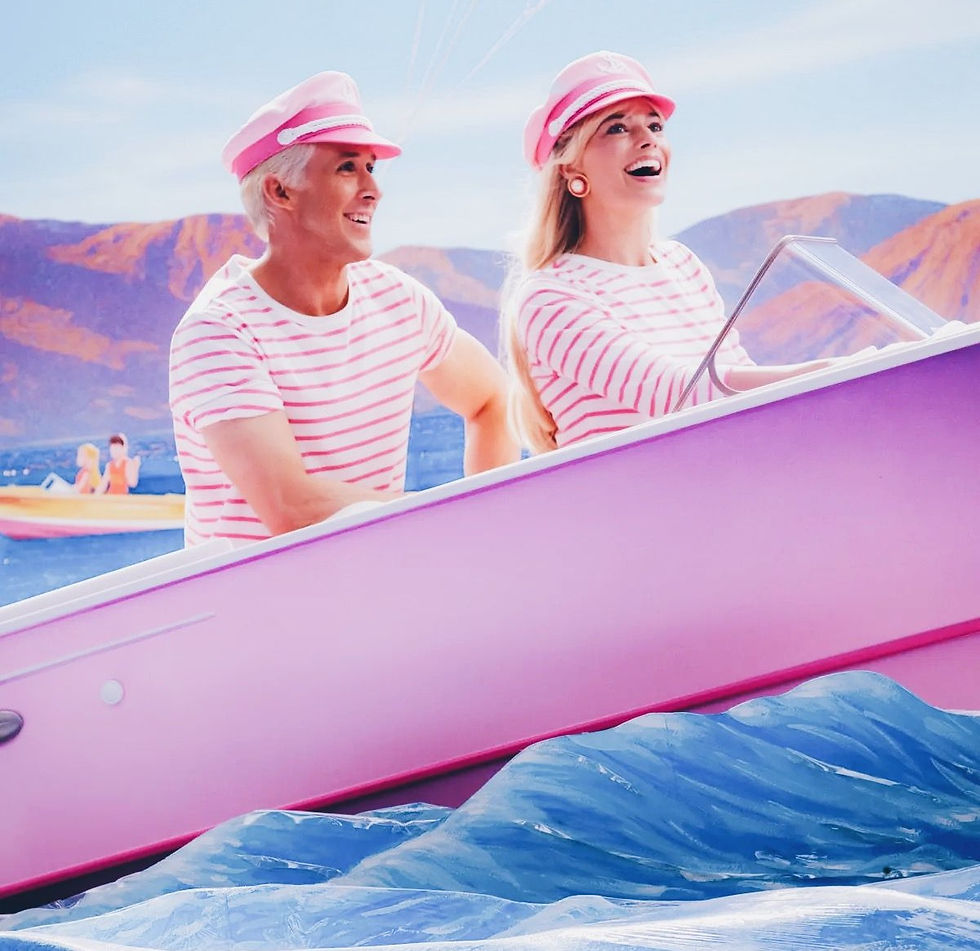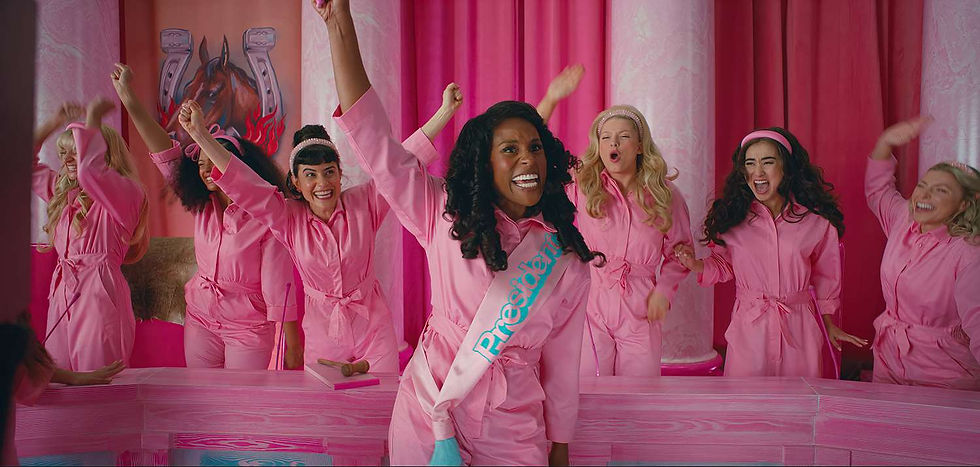Everybody knows it's Barbie season. Greta Gerwig's new Barbie film has had an absolutely phenomenal start to its season, being both the most praised and the most hated film to release in a very long time. This film spent more on its own marketing campaign than it did on the movie itself. It was part of the incredibly named Barbenheimer race alongside its co-release, Christopher Nolan's Oppenheimer. Now, I haven't seen the latter yet, so I won't be discussing it here YET. For now, I want to talk about Barbie.
I am somebody who was absolutely there for the hype about Barbie. As a film nut, it was incredible to see everybody around me feeling the excitement for a movie release - I almost didn't really care what the film was, but was happy to see the joy it was bringing to those around me. I have a Barbie t-shirt, I even dyed my hair pink in preparation. I am always here for times when the world gets behind a film, and thoroughly enjoyed seeing the competition in the Barbenheimer debate. When I walked into a cinema of pink, sat down with my pink cocktail and popcorn, I was ready. Now, I am maybe in the minority here in that I really did enjoy the film but it didn't blow my socks off.

I have a Barbie t-shirt, I even dyed my hair pink in preparation. When I walked into a cinema of pink, sat down with my pink cocktail and popcorn, I was ready.
For me, this film was a film like any other. I saw it first and foremost as another film alongside every film I've seen already, and in that regard it was good. Nothing special, but enjoyable as the kind of film that it is. On the other hand, there is undoubtedly an undertone of societal messaging here. It's a feminist film, and it showcases the plight of woman in the real world in the aftermath of Barbie's invention in 1959. It also tackles the difficulty men face in a world where toxic masculinity runs rife. Eventually, it runs to the message that we are all (K)enough just as we are. Obviously, I love this message. But I do have my issues with the way the film goes about painting it.

It's incredibly strange to rest a feminist film on the toxic idea that to have cellulite is a malfunction that warrants putting yourself in a life or death predicament.
I'm going to assume that if you're reading this then you have already seen Barbie, and I'm sure you have your own thoughts on it as a result. My main discomfort with the film is that it acts like the message here is very clear, when actually it is very nuanced. Barbie herself (played by the love of my life, Margot Robbie) is 'malfunctioning' in her development of flat feet and cellulite, and that's what sparks the entire plot. I understand this is tongue in cheek, but I think it's incredibly strange to rest a feminist film on the toxic idea that to have cellulite is a malfunction that warrants putting yourself in a life or death predicament. I get it, that's the way that Barbies are, and it's trying to show that they are unrealistic. But it's all made to be a bit confusing, and sets the film up on a premise that doesn't really work with its central message the way I think it was supposed to.

Similarly, the message for men that toxic masculinity and the patriarchy hurt them just as much as everybody else is not that clear. While Ken (played by Ryan Gosling) and all the Kens come round to the idea that they are (K)enough by the end of the film, it takes them setting up a patriarchy in Barbieland first, and then being played against each other by the Barbies to come to that conclusion. Don't get me wrong, I understand that this is satire, and there are many parallels with the way the Kens are treated here and the way women are treated in real life. I just don't think those parallels are made clear enough for the message at the end of the film to really sink in.

For me, the feminist messaging of the film is clouded by confusion. I'm not saying it's not possible for a film to be nuanced about feminist messaging, but when the rest of the film is big and brash and brightly coloured, it feels like a mismatch in aesthetic and messaging. I have read lots of reviews from people who believe that the entire film is anti-men, and I want to clarify that I don't believe that - BUT I can see why some may come to that conclusion. It makes me uncomfortable that Ken's storyline is almost a sub-plot to Barbie's, I feel it almost deserves a separate film in itself. Although perhaps that is trying to reiterate the mirroring of Ken as 'nothing without Barbie' that reflects the standard trope of women in films being 'nothing without their male counterparts'. If that's the case, I get it - it's an important thing to highlight. But, it's just not clear either way.

If there's anything Barbie has taught us, it's that seemingly harmless content can have huge rippling impacts on the world we live in.
The target audience of this film is very murky. It's trying to be something for everybody, and I don't really believe it manages it because it seems to get too bogged down in the confusing details. And while I love a film that's 'for the girls' as it were, I also don't think it clearly does that either. It's really important for us to be critical of films like Barbie when it comes to its societal messaging. If there's anything Barbie has taught us, it's that seemingly harmless content can have huge rippling impacts on the world we live in. Having said that, there are things that I really truly loved about Barbie on a personal level.
When I was a kid, I played with barbies. Although I was more the kid who 'overplayed' with them - by that I mean I cut their hair and made them new clothes out of random things I found around the house. Perhaps that's where my creativity began! I think for 90s babies like myself, Barbies have a strange nostalgic but painful part in our childhoods. We played with them innocently, and then retrospectively realised that they may have contributed to our self-criticism. That's why I want to applaud the message of true self-discovery that this film paints for its audience.

It is so empowering to hear women discrediting the dichotomous expectations that are put on them in favour of just being themselves.
Not only does Stereotypical Barbie come to realise that she doesn't have to be perfect all the time, but there is also a journey of self-acceptance and discovery for her human counterpart, Gloria (America Ferrera). This storyline is what I think really saves the Barbie movie. It's full of soft moments, but it's also full of powerful ones. Barbie seeing beauty in imperfection. Gloria's empowerment and passion. If you've seen the film, you'll know the speech I'm talking about - it made me cry. It made lots of women (and no doubt others too) cry. It was such a painful thing to hear, but so empowering to hear women discrediting the dichotomous expectations that are put on them in favour of just being themselves.

Whether you're Barbie, Gloria, Ken, even Allan - you are Kenough, cellulite and all.
For now, I want to leave you with the message that the Barbie movie is worth a watch if you enjoy that sort of thing. I think there's much to be gained from it, but I think it's important to have a critical eye when watching. And I haven't even touched on the interesting issue that it was a Mattel movie who are accepting the message that Barbie is toxic and yet gaining a huge amount of revenue from sales relating to the movie. Now that is an interesting and unique case of embedded marketing if I've ever seen one. Alas, that's a topic for the future. In this first instalment of my thoughts on Barbie, I have been very critical on the 'cellulite feminism' of the film, but I really do want to reiterate that the journey of self-discovery from all the characters was enjoyable and powerful to watch. If Mattel hadn't been part of the film, I would almost say it was Barbie writing her wrongs. Whether you're Barbie, Gloria, Ken, even Allan - you are Kenough, cellulite and all. Oh, and a special mention for Ken's musical numbers... Chef's kiss.
Until next time,
Alice xoxo


Comments